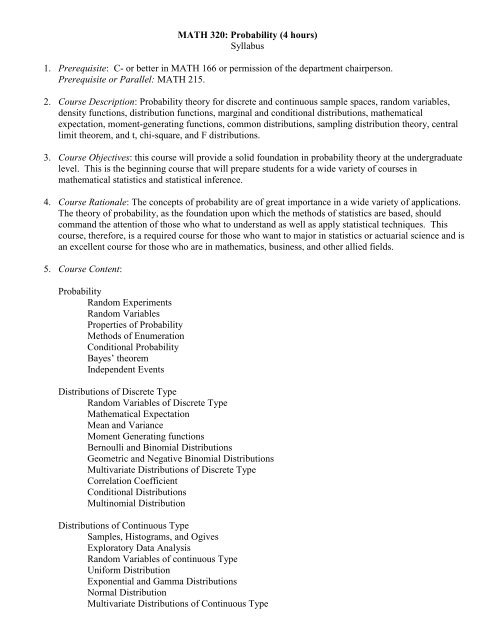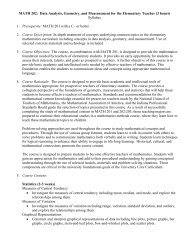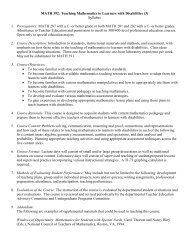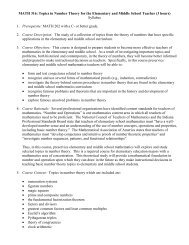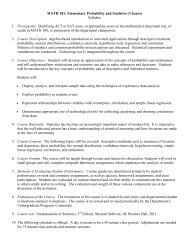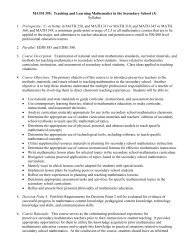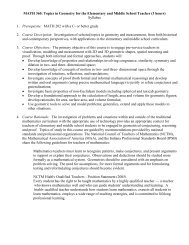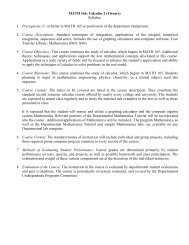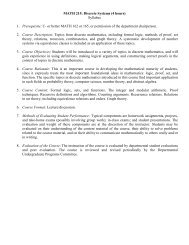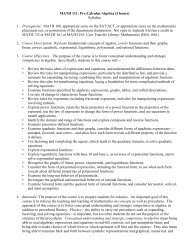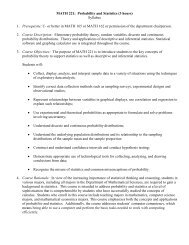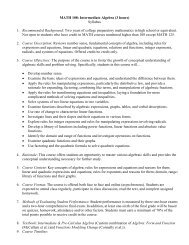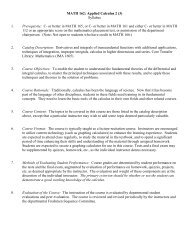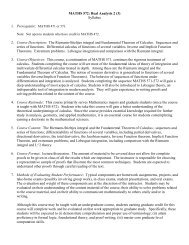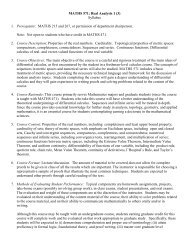Probability
Probability
Probability
You also want an ePaper? Increase the reach of your titles
YUMPU automatically turns print PDFs into web optimized ePapers that Google loves.
MATH 320: <strong>Probability</strong> (4 hours)Syllabus1. Prerequisite: C- or better in MATH 166 or permission of the department chairperson.Prerequisite or Parallel: MATH 215.2. Course Description: <strong>Probability</strong> theory for discrete and continuous sample spaces, random variables,density functions, distribution functions, marginal and conditional distributions, mathematicalexpectation, moment-generating functions, common distributions, sampling distribution theory, centrallimit theorem, and t, chi-square, and F distributions.3. Course Objectives: this course will provide a solid foundation in probability theory at the undergraduatelevel. This is the beginning course that will prepare students for a wide variety of courses inmathematical statistics and statistical inference.4. Course Rationale: The concepts of probability are of great importance in a wide variety of applications.The theory of probability, as the foundation upon which the methods of statistics are based, shouldcommand the attention of those who what to understand as well as apply statistical techniques. Thiscourse, therefore, is a required course for those who want to major in statistics or actuarial science and isan excellent course for those who are in mathematics, business, and other allied fields.5. Course Content:<strong>Probability</strong>Random ExperimentsRandom VariablesProperties of <strong>Probability</strong>Methods of EnumerationConditional <strong>Probability</strong>Bayes’ theoremIndependent EventsDistributions of Discrete TypeRandom Variables of Discrete TypeMathematical ExpectationMean and VarianceMoment Generating functionsBernoulli and Binomial DistributionsGeometric and Negative Binomial DistributionsMultivariate Distributions of Discrete TypeCorrelation CoefficientConditional DistributionsMultinomial DistributionDistributions of Continuous TypeSamples, Histograms, and OgivesExploratory Data AnalysisRandom Variables of continuous TypeUniform DistributionExponential and Gamma DistributionsNormal DistributionMultivariate Distributions of Continuous Type
Bivariate Normal DistributionSampling from Bivariate DistributionsMixed Distributions and CensoringSampling Distribution TheoryDistributions of functions of Random VariablesSums of Independent Random VariablesChi-square DistributionThe t and F DistributionsCentral Limit theoremApproximations for Discrete DistributionsLimiting Moment generating FunctionsTransformations of Random Variables6. Course Format: Lecture/discussion. The amount of material to be covered may not allow for a completetreatment in class of all topics listed in the Course Content, so students may need to supplementoverviews in class with individual reading.7. Methods of Evaluating Student Performance: Course grades are determined primarily on studentperformance of tests and the final examination, augmented by evaluation of performance onhomework.8. Evaluation of the Course: The instruction of the course is evaluated by departmental student evaluationsand peer evaluation. The course is reviewed and revised periodically by the Departmental GraduatePrograms Committee.[Ali; 2002, Nelson; 10/2005, M. Begum; Spring 2013, UPC R. Pierce Chair; Fall 2014, UPC, R. Pierce Chair]


